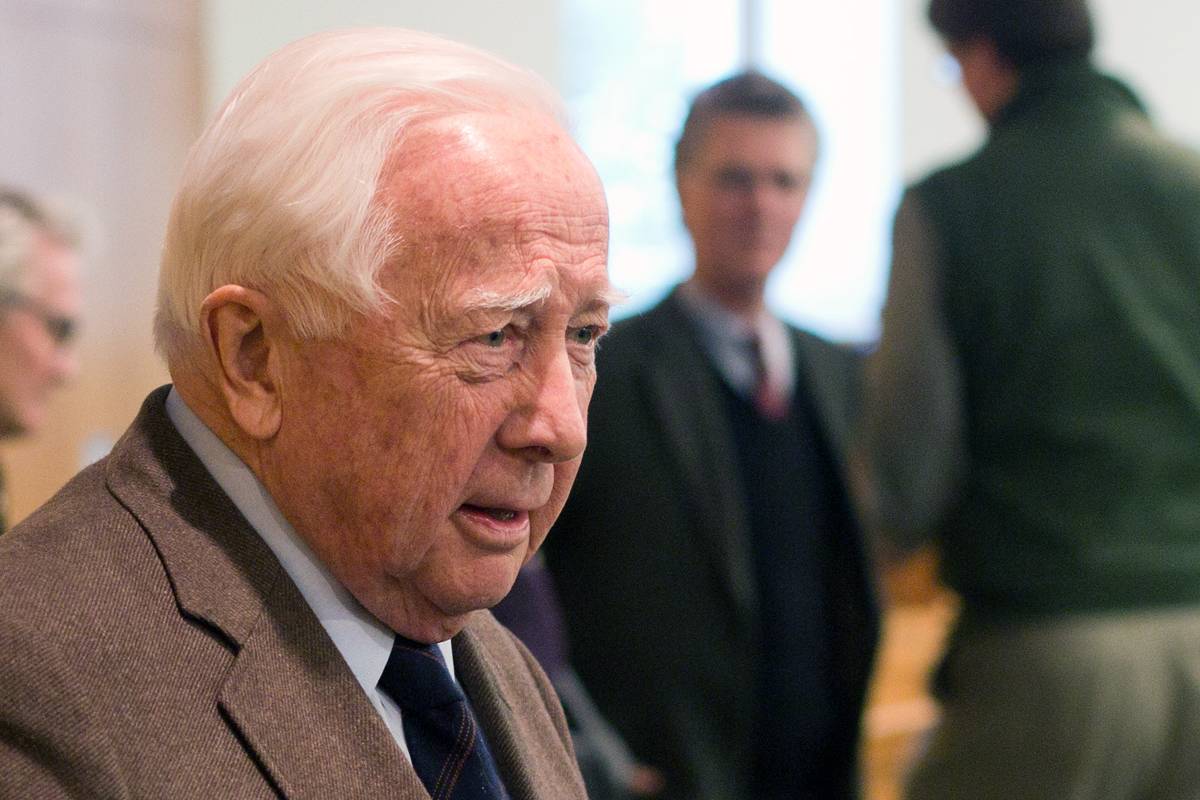Taking Flight
Pulitzer Prize winner David McCullough shared leadership lessons from the Wright Brothers.

Pulitzer Prize winner David McCullough shares leadership lessons from the Wright Brothers in Center for Global Business and Government talk.
Sold to the Smithsonian Institution for $1 by the executors of Orville Wright’s estate, the restored aircraft he and older brother Wilbur piloted at Kitty Hawk, N.C., in 1903 has been viewed by millions of people from around the world, many of whom made the journey via airplane themselves.
Perhaps the only story equal to the technological revolution that followed the Wrights’ invention, however, is the story of who they were and how they were able to do it in the first place, said author David McCullough in his Jan. 15 Tuck talk, “Lessons in Leadership from the First to Fly,” part of the Center for Global Business and Government’s Killingstad Global Insights Series.
“The Wright brothers changed the world when they made the miracle of flight happen,” said McCullough, author of “The Greater Journey: Americans in Paris,” “1776,” “John Adams,” “Truman,” “Mornings on Horseback,” “The Path between the Seas,” and “The Great Bridge.”
“But how could these two unknown young mechanics from Ohio do what the world’s greatest minds of the 19th and early 20th century couldn’t? They never went to college, let alone to a school like Tuck, but even today, we can still learn so much from them.”
A two-time Pulitzer Prize and National Book Award winner and recipient of the Presidential Medal of Freedom, the nation’s highest civilian award, McCullough discussed some of the lessons in leadership that resonated with him from his research for his forthcoming book, “The Wright Brothers.”
- Much of the Wright brothers’ success was due to their ability to use the English language, both aloud and on paper. That is essential to leadership, but the vocabulary of young people today is certifiably lower than it was 30 years ago. That is worrisome but by no means incurable. Read, read, read. However brilliant you may be in your given profession, you must be able to communicate and make the most of our magnificent gift of language.
- The Wrights grew up in a house that had no electricity, no running water, and no indoor plumbing, but they were not disadvantaged because they grew up in a house full of books. Because they were encouraged and stimulated to read and to write by their father, they turned out to be intellectually curious. No one ever asks me how much time I spend thinking, but that’s often the most important part of my process. Take the time to think.
- We cannot overstate their courage. Every time they went up, whether it was in their early gliders or in their airplanes, they knew that they could be killed. Even more inspiring than their physical courage, however, is the courage of their conviction.
- The fact that the Wright brothers were two people is emblematic to me that you don’t do much of consequence alone. Success is a team effort, always.
- Their success had nothing to do with money. In total, their project—including many trips to Kitty Hawk from Dayton, Ohio, by train, lodging, all their equipment, all the machinery they built—cost less than $1,000. They succeeded because they did the work themselves and took the right approach. When they saw something wasn’t working, they tried something else.
- They would not give up. They crashed, they got sick, they were ridiculed, they had every single thing you could imagine go wrong on their way to achieve their goal, but they would not quit. Orville was nearly killed and was crippled—they thought for life—but he came back and was still flying well into his forties. How you handle failure and setbacks is very revealing of who you are.
- To quote Wilbur Wright: “No bird soars in the calm. If you want to take off, you have to take off into the wind. You need the wind. The wind will make you.” Don’t turn your back on difficulties—use them to do what it is you aspire to achieve. Learn from failure but don’t become cynical. I am at the point where I think that one of the lessons of history is optimism.